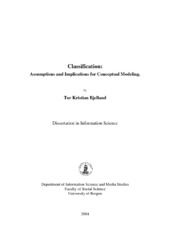Classification: Assumptions and Implications for Conceptual Modeling
Doctoral thesis
Permanent lenke
http://hdl.handle.net/1956/677Utgivelsesdato
2005-05-13Metadata
Vis full innførselSamlinger
Sammendrag
Classification is generally held to be of fundamental importance to the analysis and design of software applications. This is clearly reflected in data modelling terminology, in which terms like classification, concept, class, superclass, subclass, IS_A relationship, generalization and specialization arefrequently used. But what exactly does classification mean? This thesis contains three studies, all of which are based on the assumption that classification has not received sufficient attention by the data modelling community. The first study analyzes the concept of classification from the perspectives of diverse disciplines, such as psychology, linguistics, archaeology, artificial intelligence and data bases. The study uncovers four different senses of classification, and leads to the analyses of related concepts, such as concept, class, type, object and property. The implications that follow from the study suggest that classification may: 1. Contribute to a shared understanding of basic modelling concepts2. Result in a vocabulary that may be formally verified with respect to its completeness, logicalconsistence, and understandability.3. Provide a basis for modelling decisions.4. Emphasize socio-technical consequences and measures.5. Enhance data integrity.6. Support the validation and interpretation of conceptual models.7. Support schema integration. It is concluded that classification may be viewed as a prerequisite to conceptual modelling, and that the conceptual modelling process should be divided into two, separate tasks: the classification task, which is concerned with the definitional properties of concepts, and the modelling task, which, is concerned with the descriptive properties of the objects to which the concepts applies. The second study is conducted to test the initial assumption that classification is not properly attended to by the data modelling community. A content analysis of 29 text books on conceptual modelling and database design reveals that none of the text books contain explicit definitions of classification in all of the four senses identified in the first study. Based on the findings from the first two studies, a methodology that integrates classification andconceptual modelling is developed and presented in a separate chapter. The chapter provides atheoretical justification for a constructivist perspective on classification and conceptual modelling, explains its theoretical concepts, and describes the method through a set of guidelines and examples. The examples address the first five implications and demonstrate the pragmatic utility of the conceptual framework developed in the first study. The third study is conducted to empirically test the sixth implication, i.e., the effect of classification on interpretation tasks. It is shown that people who know the membership conditions will make other judgments than people for which the membership conditions are unknown. It is also shown that without knowledge of membership conditions people become less confident, and less consistent intheir interpretations, exhibiting larger variation in their judgments.
